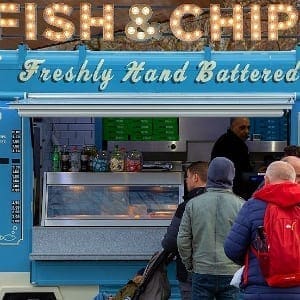
As a consultant in the restaurant and hospitality sector, I am seeing some dynamic changes – especially post-covid that are having a real impact on traditional dining. While customers are returning to restaurants, the notion of mobility in food service has many of my clients asking how they can add mobile operations and fleet-managed catering to their fixed locations.
Entering mobility options via the food truck industry is often still mostly seen as a nomadic sector. In truth, I am seeing that the industry is experiencing an exciting organizational and technological transformation across the country. From commissary kitchens to fixed restaurant locations, specialized training centers, and catering, food truck businesses are evolving to meet flexible service demands, manage labor, and expand their reach. Leading this wave of innovation are organizations like “Food is Love” and Soulcial Kitchen, along with pioneering entrepreneurs such as Jarrad Silver of Silver and Sons in the Washington, DC Bethesda area.
Commissary Kitchens: The Heart of Innovation
Commissary kitchens have become a cornerstone of the food truck revolution. These shared spaces provide food truck operators with a licensed kitchen to prepare, store, and manage their culinary creations and also provide space to create retail items such as bottled sauces and packaged products. This approach not only ensures compliance with health regulations but also fosters a sense of community among food truck entrepreneurs.
John Michel, a retired USAF Brigadier General and food truck industry expert and colleague in the St. Louis, MO area states, “Commissary kitchens are the backbone of our modern food truck ecosystem. They offer a practical solution to many logistical challenges while promoting collaboration and innovation.”
Jarrad Silver of Silver and Sons in Bethesda, MD highlights how commissary kitchens have played a vital role in his business growth. “Having access to a commissary kitchen allowed us to scale up our operations without the massive overhead costs associated with setting up a full kitchen,” he explains. “It’s been a game-changer for us.”
Fixed Restaurant Locations: Stability Meets Mobility
As noted, this model is one that I have been working on with various clients and my own food service businesses for quite some time. I have found that, while the essence of food trucks lies in their mobility, many operators are now adopting a hybrid model that may eventually lead to a fixed restaurant location. This trend allows food trucks to build credit and reputation, establish a loyal and inspired customer base, and eventually add an additional revenue stream. By incorporating rather than starting with a fixed location, operators can offer customers a carefully selected and consistent venue to enjoy their favorite meals. In the model I worked on with Jarrad Silver, it became clear that the most prudent option was to intentionally reverse engineer the operating efficiencies primarily to tackle the problem of rising labor costs (see below):
- Food Truck
- Commissary Kitchen
- Fixed location to open in November, ‘24
As Silver notes, “Our fixed location (will) enable us to build a loyal customer base and experiment with new menu items that we will later introduce in our food truck. It’s the perfect synergy.”
“Food is Love,” an organization dedicated to nurturing culinary ventures, also emphasizes the benefits of this model. “By integrating fixed locations with mobile units, food trucks can maintain their unique appeal while offering customers more accessibility,” notes a representative from the organization. In short, we call this a virtuous business cycle.
Training Centers: Preparing the Next Generation
Education and training are crucial for the continued growth of the food truck industry. Soulcial Kitchen has pioneered the concept of food truck training centers, providing aspiring entrepreneurs with the skills and knowledge necessary to succeed. These centers offer comprehensive programs covering everything from food safety and business management to marketing and culinary techniques.
“Training centers are vital for the sustainability of our industry,” explains John Michel. “They ensure that new entrants are well-prepared to meet the challenges and seize the opportunities that come with running a food truck.” Such training provides operators with the foundational knowledge and confidence needed to navigate the complexities of the food truck business.
Michel sums up the future of food truck innovation succinctly: “The integration of these elements is transforming food trucks from simple mobile units into sophisticated culinary enterprises. It’s an exciting time for the industry, and the potential for growth is immense.”
Collaborative Efforts and Future Prospects
The collaboration between organizations like “Food is Love” and Soulcial Kitchen is driving the food truck industry towards a more structured and sustainable future. In my consulting practice and in the field, I have seen that by leveraging commissary kitchens, fixed restaurant locations, and training centers, food truck operators can enhance their operational efficiency and business resilience.
Conclusion
The evolution of the food truck industry is a testament to the power of innovation and collaboration. Commissary kitchens, fixed restaurant locations, and training centers are not just trends; they are fundamental shifts that are redefining the way food trucks operate. With organizations like “Food is Love” and Soulcial Kitchen leading the charge, and visionary entrepreneurs like Jarrad Silver setting new benchmarks, the future of food trucks looks brighter than ever, offering endless possibilities for entrepreneurs and culinary enthusiasts alike.



















